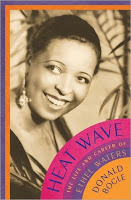Madison Avenue types know that an elevator speech—a snappy description of a product or service presented in the time span of an elevator ride— can help seal the deal if you’re pitching something. But did you know that crafting an elevator speech can also help you clarify your goals?
Being able to quickly and succinctly sum up what you’re doing in a way that excites others can be a fundamental step on the road to achieving your dreams. To begin, you only need three essential elements:
1) Passion. When you’re jazzed about something, others are often eager to jump on board. The catch is, either you feel genuinely excited about what you’re trying to convey or you don’t. If you don’t, look in the mirror and ask yourself whether you're going down the right path for your temperament and talents. Chances are, you're not--and that's an important piece of information to have as you figure out how to move forward.
2) Clarity. Until your destination is clear, it’s difficult to forge full speed ahead. The clarity it takes to write a good elevator speech comes not only from answering three basic questions—who am I trying to reach, what is my core message, and why should others care? —but through a great deal of trial and error. Fortunately, the feedback to an elevator speech is immediate. If people’s eyes glaze over, you need to keep revising until your audience not only looks interested but starts asking for more information.
3) A strong sense of how your work can help others. Whether you’re writing a book and looking for an agent, pitching a product and looking for customers, or starting a company and looking for capital, you need to be able to convey to your listeners what’s in it for them. Will your book spark interesting discussions? Will your product fill a void? Will your company meet some need that others don’t? If so, show how in as few words as possible.
Take the following blurb from the March 2011 issue of O Magazine for film historian Donald Bogle's new biography Heat Wave: The Life and Career of Ethel Waters. For a moment, imagine that someone has asked Bogle to describe his book. Here's his reply:
“[It’s] an exhaustive biography of the audacious entertainer who shattered racial barriers, wowed audiences, and famously feuded with other African-American show-biz legends.”
In just twenty-four words, this description simultaneously gives us a clear idea of what Bogle's book is about and leaves us wanting more. What’s so audacious about Ethel? How and when did she shatter those racial barriers? And with whom and over what did she famously feud?
How much time do you imagine it took the writer (no credit is given) to compose this short paragraph? I have no idea, but my guess is, a lot longer than you think.
(Photo Website: pictorio3.24.eu)


All three of those are excellent! If you're not excited, the person listening certainly won't be excited. And people are naturally selfish - they want to know how something benefits them, not you. Good tips, Prill!
ReplyDeleteThanks, Diane. I use my elevator speeches all the time. My friend Penny Pearlman is the person who taught me the WIIFM Factor. "What's in it for me?"--that's what people want to know.
ReplyDelete